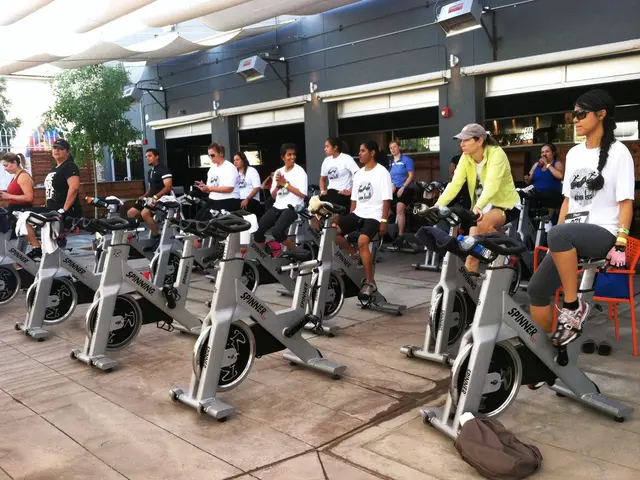Embrace Aging Gracefully: Secrets to Healthy Eating
Maintaining Nutritious Diet During Old Age
Aging gracefully isn't just about looking great; it's also about feeling fantastic inside and out. The key to this lies in adopting a healthy diet that fits your lifestyle. Eating well as you age is more than just consuming nutritious food, it's about savoring the culinary experience, sharing meals with loved ones, and indulging in the pleasures of good food.
No matter your age or past eating habits, it's never too late to make changes and start enjoying a healthier lifestyle. Here are some ways you can amplify your diet to support your needs and indulge in the joys of eating:
Reap the Rewards: The Benefits of a Healthy Diet
- Boost longevity and vitality: A balanced diet can improve immunity, fight harmful toxins, maintain a healthy weight, and significantly reduce the risk of heart disease, high blood pressure, type-2 diabetes, and various forms of cancer.
- Sharpen your mind: Consuming fruits, vegetables, and fish rich in omega-3 fatty acids can help improve focus and potentially lower the risk of developing Alzheimer's disease. Antioxidant-rich foods, such as green tea, may also contribute to enhanced memory and mental alertness.
- Promote emotional well-being: Feeling good comes from within, and wholesome meals can increase your energy levels, improve your mood, and boost your self-esteem. The connection between body and mind means that when your body feels good, you'll feel happier, both inside and out.
Eating Well isn’t Just About the Food
Eating healthfully as you age goes beyond the quality and variety of your food. Your social life is just as important in maintaining a nutritious diet. The company you keep and the atmosphere around the table can make a meal even more enjoyable, motivating you to stick to a healthy eating plan.
Even if you're living alone, you can still turn mealtime into a pleasure. Here are some tips to make your meals feel more special:
- Shop 'til you drop: Go grocery shopping with a friend and chat while searching for new ideas and scooping up discount deals.
- Pass the apron: Invite a friend over and split cooking duties. Prepare the main course while your friend whips up dessert, for instance. Cooking together can be a fun way to strengthen your bond and cut costs.
- Get social: Eating with friends, family, or even neighbors can be just as important as adding vitamins to your diet. Sharing a meal provides mental stimulation and makes eating more enjoyable, helping you stay on track with your healthy eating plan.
Cultivating a Healthy Senior Diet
The secret to a healthy diet lies in focusing on minimally processed foods that your body craves as you age. Every individual is unique, so finding the perfect diet may take some experimentation. These tips will help you start off on the right foot:
- Load up on fruits and veggies: Branch out beyond apples and bananas. Experiment with colorful, nutrient-rich options like berries, melons, leafy greens, carrots, and squash. Aim for two to three servings a day.
- Embrace calcium: Calcium is vital for maintaining bone health, nerve health, hormone health, and muscle health. Aim for 1200mg a day, which can be found in dairy products like milk, yogurt, and cheese, as well as non-dairy sources such as tofu, fortified soy milk, fortified orange juice, broccoli, almonds, and kale.
- Choose good fats, not no fats: Rather than cutting out all fats, focus on enjoying healthy fats, such as omega-3s, which can support your body and protect against disease. The best sources of omega-3s are fatty fish like salmon, mackerel, sardines, and tuna.
- Vary your protein sources: Lean proteins like fish, beans, peas, eggs, nuts, and seeds can help boost your mood, decrease your stress levels, and enhance your mental clarity. Avoid relying solely on red meat and opt for other options as well.
- Digest better with fiber: Incorporating dietary fiber can keep you regular, lower your risk of heart disease, improve the health of your skin, and even aid in weight loss. Women over 50 should aim to consume at least 21g of fiber per day, while men over 50 should aim for a daily intake of 30g.
Healthy Eating Isn’t Just About Nutrition
Eating healthfully also means enjoying your food and making mealtimes a social event. So, be sure to prioritize pleasure and connection as you make the shift towards a healthier diet. With these tips, you're already on your way to enjoying a satisfying senior diet that fuels your body, nourishes your soul, and strengthens your emotional well-being.
- Integrating science into your senior diet can help you make informed choices about the foods you eat, ensuring you get the necessary nutrients for overall health and wellness, particularly in the areas of aging, longevity, and mental acuity.
- By understanding the relationship between nutrition, aging, and health-and-wellness, you can support your immune system, reduce the risk of certain age-related diseases, and improve your emotional well-being, all while enjoying the culinary experience and indulging in the pleasures of good food.






